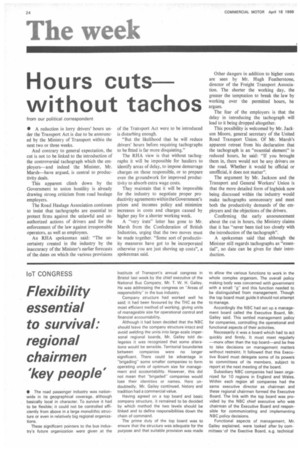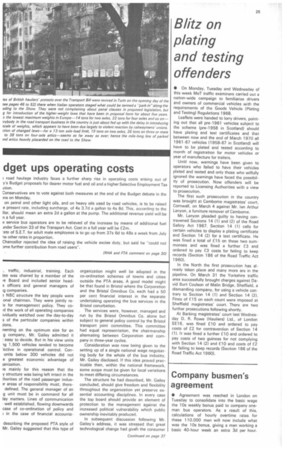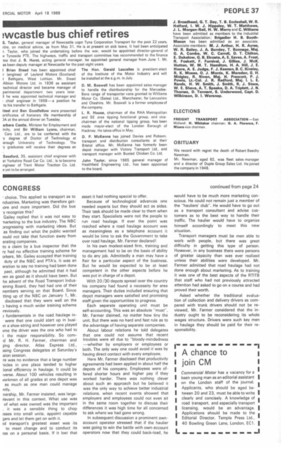loT CONGRESS
Page 26

Page 27

Page 39

If you've noticed an error in this article please click here to report it so we can fix it.
Flexibility essential to survival: regional chairmen 'key people'
• The road passenger industry was nationwide in its geographical coverage, although basically local in character. To survive it had to be flexible; it could not be controlled efficiently from above in a large monolithic structure or even in relatively big regional organizations.
These significant pointers to the bus industry's future organization were given at the Institute of Transport's annual congress in Bristol last week by the chief executive of the National Bus Company, Mr. T. W. H. Galley. He was addressing the congress on "Areas of responsibility" in the bus industry.
Company structure had worked well he said; it had been favoured by the THC as the most efficient method of working, giving units of manageable size for operational control and financial accountability.
Although it had been decided that the NBC should leave the company structure intact and avoid welding the units into large-scale impersonal regional boards, Mr. Gailey told delegates it was recognized that some alterations would be sensible. Territorial boundaries between companies were no longer significant. There could be advantage in "brigading" some smaller companies to form operating units of optimum size for management and accountability. However, this did not mean that "brigaded" companies would lose their identities or names. Here undoubtedly. Mr. Gailey continued, history and tradition had a commercial value.
Having agreed on a top board and basic company structure, it remained to be decided by which method the two levels should be linked and to define responsibilities down the chain of command.
The prime duty of the top board was to ensure that the structure was adequate for the purpose and that suitable provision was made to allow the various functions to work in the whole complex organism. The overall policy making body was concerned with government with a small "g" and this function needed to be distinguished from management. Though the top board must guide it should not attempt to manage.
Accordingly the NBC had set up a management board called the Executive Board, Mr. Gailey said. This settled management policy for companies, controlling the operational and functional aspects of their activities.
Necessarily it was a board which had to act quickly and firmly. It must meet regularly —more often than the top board—and be free to take decisions on management matters without restraint. It followed that this Executive Board must delegate some of its powers to committees of its members, subject to report at the next meeting of the board.
Subsidiary NBC companies had been organized for 10 regions in England and Wales. Within each region all companies had the same executive director as chairman and these regional chairmen formed the Executive Board. The link with the top board was provided by the NBC chief executive who was chairman of the Executive Board and responsible for communicating and implementing NBC policy decisions.
Functional aspects of management, Mr. Galley explained, were looked after by committees sof the Exective Board, e.g. technical , traffic, industrial, training. Each Lee was chaired by a member of the re Board and included senior heads officers and general managers of lg companies.
?. NBC structure the key people were onal chairmen. They were jointly rele for management policy. They co d the work of all operating companies ividually watched over the day-to-day s of the particular companies within lions.
nenting on the optimum size for an g company, Mr. Gailey admitted it easy to decide. But in his view units ig 1,500 vehicles tended to become 'ective in operational control. Conunits below 300 vehicles did not e greatest economic advantage of Ian ization.
is mainly for this reason that the y structure was being left intact in the thorities of the road passenger indusir areas of responsibility must, theredefined. The general manager of an g unit must be in command for all lay matters. Lines of communication well established, flowing downwards case of co-ordination of policy and ; in the case of financial accounta describing the proposed PTA style of Mr. Gailey suggested that this type of organization might well be adopted in the co-ordination schemes of towns and cities outside the PTA areas. A good model might be that found in Bristol where the Corporation and the Bristol Omnibus Co. each had a 50 per cent financial interest in the separate undertaking operating the bus services in the Bristol conurbation.
The services were, however, managed and run by the Bristol Omnibus Co. alone but subject to general policy control by the Bristol transport joint committee. This committee had equal representation, the chairmanship alternating between Corporation and company in three-year cycles.
Consideration was now being given to the setting up of a single national wage negotiating body for the whole of the bus industry, Mr. Gailey disclosed. If this idea proved practicable then, within the national framework, some scope must be given for local variations to meet differing circumstances.
The structure he had described, Mr. Gailey concluded, should give freedom and flexibility throughout the organization yet preserve essential accounting disciplines. In every case the top board should provide an element of protection to the management against the increased political vulnerability which public ownership inevitably produced.
In subsequent discussion following Mr. Galley's address, it was stressed that great technological change had giverh the consumer • choice. This applied to transport as to ndustries. Marketing was therefore getlore and more important. Did the bus y recognize this?
Gailey replied that it was not easy to tiarketing to the bus industry. The NBC Progressing with marketing ideas. But as finding out what the public wanted iould not take that function away from erating companies.
to a claim by a bus inspector that the ry had no effective training scheme for orkers, Mr. Gailey accepted that training duty of the NBC and PTA's. It was an eration to say no training had been done past, although he admitted that it had !en as good as it should have been. But he advent of the Road Transport Indusaining Board, they had had one of their nembers serving on that Board Since tting up of the NBC on January 1, Mr. disclosed that they were well on the 3 having a much wider training scheme reviously.
) fundamentals in the road haulage inwere that one could start up in busiin a shoe-string and however one played 'me the driver was the one who had to I the major responsibility. So cornAl Mr. R. H. Farmer, chairman arid 3ing director, Atlas Express Ltd., ;sing Congress delegates at Saturday's ision session.
re was no evidence that a large number Picles in one place tended to higher .ional efficiency in haulage. It could be verse. About 100 vehicles resulting in vorkmen of all grades at one depot was as much as one man could manage ntly.
nership, Mr. Farmer insisted, was largelevant in this context. What use was of what was owned was the important it was a sensible thing to chop ?.sSeS into small units, appoint capable jers and let them get on with it.
Id transport's greatest asset was its to meet change and to conduct its ?.Ss on a personal basis. If it lost that asset it had nothing special to offer.
Because of technological advances one needed experts but they should act as aides. Their task should be made clear to them when they start. Specialists were not the people to run road haulage. If ever the point was reached where a road haulage account was as meaningless as a telephone account it would be time to ask the Government to take over road haulage, Mr. Farmer declared!
In his own modest-sized firm, training and management had to be on the basis of ability to do any job. Admittedly a man may have a flair for a particular aspect of the business. But he would be expected to be at least competent in the other aspects before he was put in charge of a depot.
With 20/30 depots spread over the country his company had found a necessity for area managers. Their duties included ensuring that depot managers were satisfied and promising staff given the opportunities to progress.
Each separate operating unit must be self-accounting. This was an absolute "must", Mr. Farmer claimed, no matter how tiny the unit. But there was no hard and fast rule as to the advantage of having separate companies.
About labour relations he told delegates that one could not assume that recent troubles were all due to "bloody-mindedness —whether by employers or employees or both. The only way one could avoid it was by having direct contact with every employee.
Here Mr. Farmer disclosed that productivity agreements had been applied in about half the depots of his company. Employees were offered shorter hours and higher pay if they worked harder. There was nothing clever about such an approach but he believed it was the only way to achieve better industrial relations. when recent events showed that employers and employees could not even sit in the same room together to discuss their differences it was high time for all concerned to ask where we had gone wrong.
In subsequent discussion a prominent ownaccount operator stressed that if the haulier was going to win the battle with own-account operators now that they could back-load, he would have to be much more marketing conscious. He could not remain just a member of the "hauliers' club". He would have to go out as a transport consultant and advise customers as to the best way to handle their traffic. The haulier would have to organize himself accordingly to meet this new situation.
Transport managers must be men able to work, with people, but there was great difficulty in getting this type of person. However, in any business there were persons of greater capacity than was ever realized unless their abilities were developed. Mr. Farmer admitted that road haulage had not done enough about marketing. As to training it was one of the best aspects of the RTITB that staff who had not previously attracted attention had asked to go on a course and had proved their worth.
Asked whether the traditional evaluation of collection and delivery drivers as compared with trunk drivers should not be reviewed, Mr. Farmer considered that the industry ought to be reconsidering its whole wages structure. Drivers were such key men in haulage they should be paid for their responsibility.
































































































































